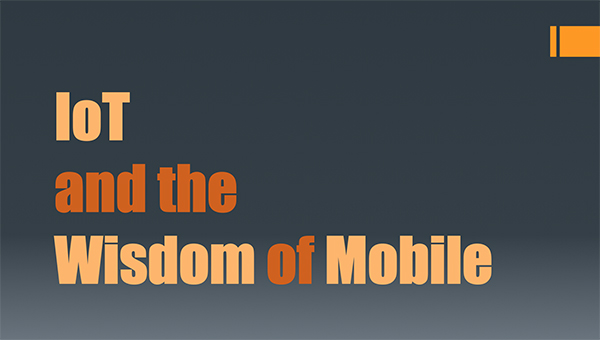
IoT and the Wisdom of Mobile
Industrial revolutions come and they go. Their impact measured over time by the progress their disruptions brings and, typically, measured in how we reacted and evolved due to that disruption. Personal computing, the Internet, and Mobile devices are all prime examples of such massively disruptive forces and now the Internet Of Things (IoT) has taken the world by storm with it’s tentacles of connectivity growing exponentially by the minute. Sound a bit dramatic? Well, it’s not. With over 12 billion (yes, I said “billion”) devices connected today and 5000 more wired up by the time you’re done reading this article, the hyper-connectivity of IoT is here with it’s promise of dramatically increasing the quality of our lives.
Rough estimates give the IoT impact an economic impact north of $11 trillion per year by 2025. This is relatively the same about of fiscal value Mobile will have by then, but mobile’s been around the block a heck of a lot longer so to say IoT is the greater disruptor is an understatement.
Since Mobile’s been around so long, what have we learned from that revolution that can help us in this new connected age of IoT? A great deal, when you break it down! Pretty much all the big aspects of mobile development and testing can be applied to IoT. From firmware on the device, to the network protocols and APIs they use to communicate, the security of those connections, the data transferred to and from the device are all existing technologies used in Mobile. Meaning we already have the knowledge to be prepared for and thrive in a hyper-connected world. That’s a good part of the message. The challenging part is in managing the scale, managing and maintaining the software on the devices, managing the increasing demands on APIs and big data management, and managing the increased security threats that this hyper-connectivity will create.
To that, security, data management, and test automation become even greater aspects of IoT that absolutely must be mastered to not just keep pace but, if you do it right, stay ahead of the curve.
Managing security, alone, is shaping up to by a big IoT market differentiator as the key threats research tells us, when breaking it down to it’s most simple form, is that you have more access points to a network generating potentially mass amounts of data about you. Device fragmentation, over the air software updates, 3rd party API integrations, big data, and all of it networked are all the big challenges we’ve seen from mobile are all present in the world of IoT but at greater scale.
With the big friction points being security, data management, API management, and software and firmware updates to the connected devices, we see that we have the knowledge to thrive in the new IoT world! Don’t let the hype scare you away from this new reality, that if you’ve been on top of your mobile game, which most of the industrialized world has for some time, then you have what it takes.


